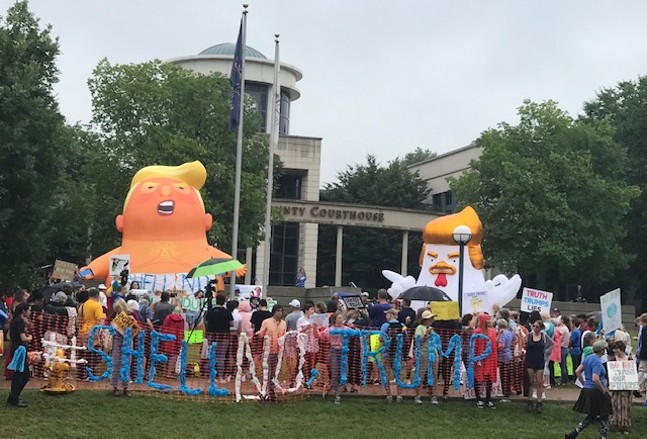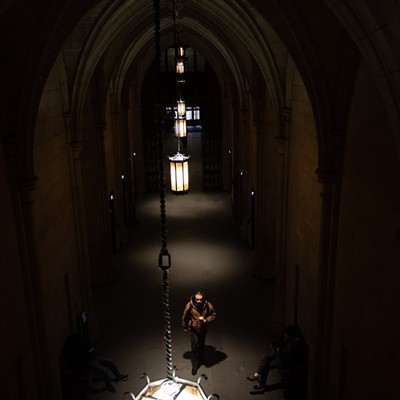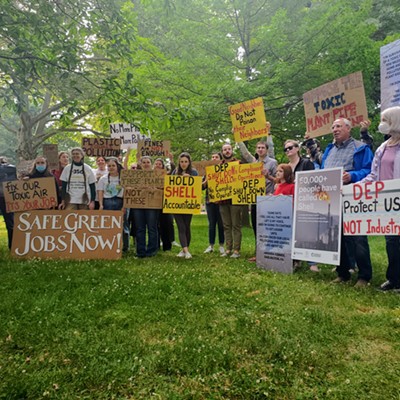But across the river from the cracker plant in Beaver borough, more than 100 protesters gathered to decry Trump’s environmental policies and the creation of the cracker plant.
Natalie Leslie, a Beaver County resident, organized the rally and told the crowd that Trump has failed to do anything to address environmental concerns.
“He is not concerned at all for the state of the environment,” says Leslie. “We need this man out of office or this will not end.”
One of the concerns brought up by environmentalists was the amount of plastic the cracker plant would create. Cracker plants create plastic pellets that are typically shipped to manufacturers to create many different plastic products. Environmentalists worry the cracker plant and potential future plants will further incentivize a large supply chain of plastics at a time when many people are trying to cut back on using plastic.
According to National Geographic, there are more than 8.3 billion metric tons of plastic worldwide, most of it created for disposable products that end up as trash.
Terrie Baumgardner is a member of the Breathe Project air quality group who lives six miles from the cracker plant, which is located near Monaca. She mentioned a recently published consortium of 1,500 studies that show the negative side effects of natural-gas drilling, which is necessary to fuel cracker plants. The Beaver County cracker plant has been permitted to emit 2.2 million tons of carbon dioxide, the equivalent of adding more than 480,000 cars to the region.This is not just an anti-Trump protest, most politicians in the Pittsburgh area, including several Democrats, support or have remain neutral on the environmental impacts of cracker plant. People are dressed in plastic waste to show the potential harms of creating more plastic. pic.twitter.com/97i8ZzAVwu
— Pittsburgh City Paper (@PGHCityPaper) August 13, 2019
She says fracking and the cracker plant are too dangerous to the regions’ public health to support, and that the boon of plastic that it will create is temporary.
“We don’t need that,” says Baumgardner referencing the water contamination, air pollution, and greenhouse gases that fracking has shown to create. “We don’t need the plastic this plant will produce. This plant will accelerate climate change.”
During his visit to the cracker plant, Trump said the problem with plastics wasn’t that it was being created or used, but that it was being produced by China and other Asian countries.
“Plastics are fine, but you have to know what to do with them,” said Trump, according to White House pool transcripts. “But other countries are not taking care of their plastic use and they haven’t for a long time.”Here's full quote from Trump on plastics, btw: pic.twitter.com/0vPi9o6WlQ
— Julian Routh (@julianrouth) August 13, 2019
According to the Environmental Protection Agency, only 9.1 percent of plastic generated in the U.S. was recycled in 2015. About 15 percent of U.S. plastic was combusted for energy, and 75 percent was sent to landfills, the majority of which was shipped to other countries, including China.
Protesters in Beaver carried signs that were anti-fracking, anti-plastic waste, and in favor of the Green New Deal, a sweeping proposal to move the U.S. off of reliance on fossil fuels by providing jobs building wind and solar energy plants, as well as upgrading the country's infrastructure and electrical grid.
Carl Davidson, of Aliquippa, attended the rally and says Beaver County needs the Green New Deal. “God bless AOC,” says Davidson, referring to U.S. Rep. Alexandria Ocasio-Cortez (D-N.Y.) who has been a staunch advocate for the Green New Deal.
He says that while the cracker plant is providing about 5,000 temporary construction jobs, the plant will only provide 600 permanent jobs. Shell was provided with $1.65 billion in subsidies for building the cracker plant.
“This plant will produce plastics and methane,” says Davidson. “It’s dangerous and poisonous.”
He noted the legacy in Beaver County to sacrifice public health for jobs, noting the county’s history producing steel. But Davidson says it doesn’t have to continue. The county could support the Green New Deal to create sustainable, green jobs. He says government costs associated with the Green New Deal shouldn’t be a major concern, because the jobs and infrastructure created will be productive and thus worth the investment. For example, he says President Franklin Roosevelt didn’t fret about costs when creating the Hoover Dam.
“If you want to build something productive,” says Davidson. “It doesn’t matter about the costs. It will be worth it. The money will come back.”



















